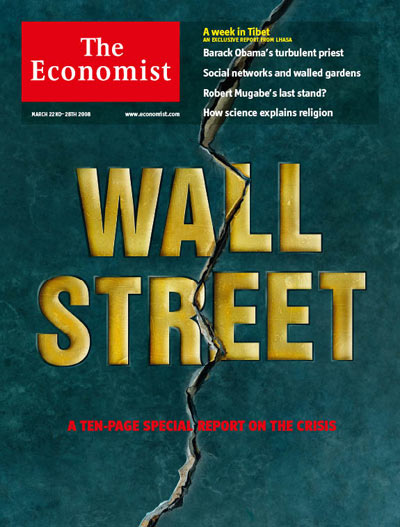
Image source: Economist.com
Coming from home last Thursday, I sorted through my mail to find my copy of the Economist, one day early from its usual Friday delivery. Of course, last week’s copy has barely been opened, and now the pressure it on. I don’t often read it cover to cover, but I try to skim each section. I am a firm believer in the ideas that is always a good idea to have a vague notion of what you don’t know. But each week around Wednesday or Thursday, I get a little nervous but I know the next issue is on the way.
The Economist, as a publication itself, got some press recently. Mostly because it is one of the few news publication that is pushing for more growth, rather than shrinking, trying to grow from 700,000+ US subscribers to one million in the next five years. Jon Friedman at MarketWatch wondered out loud if they push would dumb down the coverage. I certainly hope not, an doubt that they will, unless they want to alienate their constituency, which editor-in chief, John Micklethwait, describes as “people who want an intelligent read.”
Although the wit of cover headlines and artwork is amusing, that the fact that the magazine has a distinct point of view is one of the most important aspects of the magazine and why it is successful. It has a single value proposition: The weekly magazine in depth analysis of of global news from a pro-free market perspective. How would you describe Time or Newsweek in one sentence?
The Economist provides coverage on every region, each week. (You get a steady stream of articles on the developing world, that are go beyond natural disasters and civil wars.) They stay away from celebrities, popular culture coverage, scoop driven reporting, and thankfully “best of” lists. Their unified perspective is so rigorous that they don’t provide by-lines, even to their columnists.
Fox News’ success can be similarly linked to attracted audiences, because their viewers are looking for a specific point of view. However, the Economist is able to stay above the fray of partisanship, and the criticism that is linked to it. Because the position they have taken is not directly linked to a political party, they can be more critical of both sides. One article can be pro-privatization of state owned industries and another can be pro-stem cell research at the same.
Today, “mainstream” journalism thrives for “objective” coverage, which I’m starting to feel is impossible. Balanced reporting often becomes let’s try not to upset our sources, advertisers and readers. Articles in the Economist offer opinions (which I don’t always agree with) if a policy is good or bad, as well as recommendations, and solutions to problems. Readers rarely get that in other US news publications, outside of the Op-Ed pages. Traditional news organziation, such as Time, Newsweek, but also the New York Times and the Washington Post, need to be more polemic, not less. As stated in a previous post, people will want to pay for quality content, even in the (gasp) print media format, while competing with all that “free” information.




I think the “objectivity obsession” will hurt newspapers. This article is interesting on the topic:
http://www.newyorker.com/reporting/2008/03/31/080331fa_fact_alterman?currentPage=all
“Before Adolph Ochs took over the Times, in 1896, and issued his famous “without fear or favor†declaration, the American scene was dominated by brazenly partisan newspapers. And the news cultures of many European nations long ago embraced the notion of competing narratives for different political communities, with individual newspapers reflecting the views of each faction. It may not be entirely coincidental that these nations enjoy a level of political engagement that dwarfs that of the United States.”